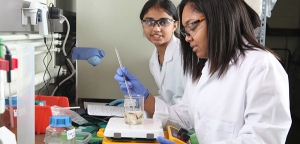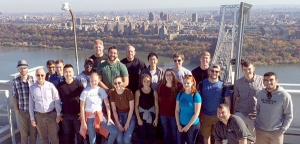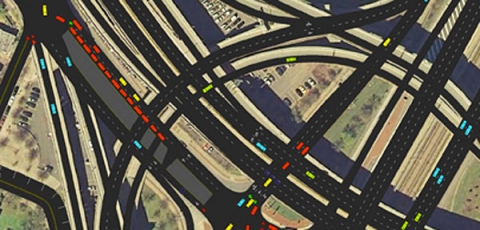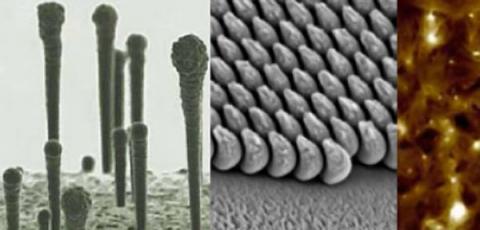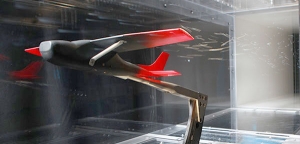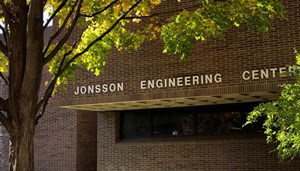As a pioneer in applied education, Rensselaer Polytechnic Institute is world-renowned for the creativity and effectiveness of its pedagogy. Across seven departments offering 11 undergraduate and 19 graduate degrees, our students learn the fundamentals of math, science, and engineering, and gain in-depth knowledge in their technical fields through hands-on learning, laboratory experiences, and multidisciplinary design opportunities. Instilled with curiosity and a love of learning, they graduate prepared to innovate, collaborate, communicate, and lead in a socially responsible and ethical manner.
Academics
Departments
Biomedical Engineering
Biomedical engineers work with cutting-edge technologies to tackle grand challenges related to the application of engineering principles to human physiology. They advance human health, engineer better medicines, and create the tools of innovation and scientific discovery by designing solutions to problems at the interface of biology, medicine, and engineering. At Rensselaer, the BME curriculum combines significant life science content with engineering and basic science courses. Undergraduate BME students can select one of three offered concentrations (biomaterials, biomechanics, bioimaging/instrumentation) and also have the option of combining these with a pre-med or a management minor as well as the standard BME curriculum.
Majors:
- Biomedical Engineering (B.S., M.Eng, M.S., Ph.D)
Chemical and Biological Engineering
The Howard P. Isermann Department of Chemical and Biological Engineering prepares students to enter their engineering practice dealing with chemical as well as physical processes to meet the challenges of the future. The curriculum, which builds on chemistry, biology, mathematics, basic sciences, and engineering science, culminates in professional applications in which theory is tempered by engineering art and economic principles. Through this curriculum, graduates are prepared equally well for professional practice or for advanced study.
Majors:
- Chemical Engineering (B.S., M.Eng, M.S., Ph.D)
Civil and Environmental Engineering
Civil and environmental engineers focus on the analysis, design, construction, maintenance, and operation of physical systems both large and small. To ensure the proper construction and care of these complex systems and environments, Rensselaer civil and environmental engineers develop a full range of skills in design, analysis, fabrication, communication, management, and teamwork. The current rebuilding of the world’s roads, bridges, water and sewer systems, and other physical facilities has heightened society’s awareness of the profession and given it added prominence. The growing panoply of sensors, instrumentation, intelligent facilities, and new materials is also highlighting the high-tech character of the discipline, creating new educational challenges and redefining the skill set that civil and environmental engineers need to succeed.
Majors:
- Civil Engineering (B.S., M.Eng, M.S., Ph.D)
- Environmental Engineering (B.S., M.Eng, M.S., Ph.D)
Electrical, Computer, and Systems Engineering
Addressing perhaps the broadest of scientific disciplines, Electrical, Computer, and Systems Engineering (ECSE) rests on a wide range of scientific fundamentals and therefore offers numerous advantages for undergraduate and graduate study. Among them is the ability to attack the many facets of modern problems of social relevance that cut across disciplinary lines. The flexibility for students to embark on individually tailored programs and for the department to launch new areas of research is a hallmark of ECSE.
Majors:
- Computer & Systems Engineering (B.S., M.Eng, M.S., Ph.D)
- Electrical Engineering (B.S., M.Eng, M.S., Ph.D)
Industrial and Systems Engineering
The Department of Industrial and Systems Engineering offers degree programs at the bachelor’s, master’s, and doctoral levels including the bachelor’s and master’s degree in Industrial and Management Engineering, and the doctoral degree in Decision Sciences and Engineering Systems. The common theme throughout the department’s academic programs is the use of mathematical, statistical, and computational/simulation models to better understand, predict, and optimize complex engineering, managerial, operational, and physical systems.
Majors:
- Industrial and Management Engineering (B.S., M.Eng, M.S., Ph.D)
Materials Science and Engineering
Progress in modern technology is often limited by the availability of suitable solid materials. The materials engineer must produce materials to meet the demands of the designers of jet engines and rocket boosters, microelectronic devices, optical components, medical prostheses, and many other products. The principles that govern the processing and structure of materials to produce optimum mechanical and physical properties and performance are embodied in the materials engineering curriculum. The program is designed to produce engineers and scientists whose degrees represent useful specialization coupled with a broad background in all classes of materials.
Majors:
- Materials Engineering (B.S., M.Eng, M.S., Ph.D)
Mechanical, Aerospace, and Nuclear Engineering
Mechanical engineers are engaged in a wide range of activities. At one end of the spectrum, they are concerned with fundamental engineering science, especially energetics and mechanics. At the other end, they are involved with the hardware of various technologies—the design and manufacture of mechanical components and systems. Aerospace engineering is concerned with disciplines and technologies that pertain not only to aircraft and spacecraft, but to other vehicular systems such as submarines and hydrofoils as well. Nuclear engineering focuses on the methods, devices, and systems required for the peaceful use of nuclear technology.
Majors:
- Aeronautical Engineering (B.S., M.Eng, M.S., Ph.D)
- Aerospace Engineering (B.S.)
- Mechanical Engineering (B.S., M.Eng, M.S., Ph.D)
- Nuclear Engineering (B.S., M.Eng, M.S., Ph.D)
Programs
Design, Innovation, and Society
DIS prepares students to become innovative designers capable of developing and designing the advanced products and technologies for the 21st century. Built around a design studio during seven of eight semesters, DIS combines the technical sophistication of Rensselaer’s engineering or management curricula with the aesthetic and cultural insights and vision of the humanities and social sciences disciplines in the DIS curriculum.
